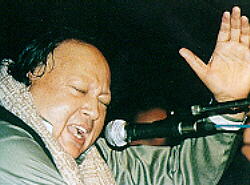Pakistani Singer Is A Divine Master And A Pop Star
“The following Article was published on January 22, 1993, just one day before NFAK’s Unforgettable performance at Meany! in Seattle Times and is posted here with their permission. Read Along”
Tomorrow: Nusrat Fateh Ali Khan in concert, Meany Theater, 8 p.m., sold out. 543-4880. In Pakistan and North Indian mausoleums, singer Nusrat Fateh Ali Khan is widely celebrated as a powerful conveyor of the spiritual message. In the West his versatile voice, melodic sensibility and deeply passionate delivery have made him one of the most popular performers of contemporary world music. Last September, Khan came to Seattle at the invitation of the University of Washington ethnomusicology department as a visiting artist. Khan will be teaching there through March. Tomorrow, he gives his first public performance here, accompanied by an ensemble of nine musicians. Descended from a long line of Pakistani qawwals (devotional singers who traditionally perform in Muslim shrines), Khan is also a Sufi, which is a sect of extremely faithful Muslims known for their intense inner devotion to the prophet Mohammed and the people of Islam. Through music, song and dance, the Sufi is able to express his absolute devotion and give a potent message to those who hear him. Khan’s highly individual interpretations of the centuries-old qawwali song-poems have made him a hero among his people and the most celebrated divine master in the history of the tradition. But what is even more remarkable is the effect Khan has had on people who are unfamiliar with the qawwali tradition and the Muslim religion. Musician and record producer Peter Gabriel was so moved by attending a performance by Khan that he immediately brought Khan into his Real World studios in 1989 and recorded “Shahen-Shah” for his Real World Records label. Khan has since made two more recordings for the label and is Gabriel’s top-selling artist. Lorraine Sakata, a UW ethnomusicology professor who conducted field work in Pakistan and was instrumental in bringing Khan to Seattle, has vivid memories of her first encounter with Khan and his music. “I had never heard him before and did not know much about the qawwali tradition,” Sakata recalled. “What I felt when I heard him perform was like nothing I had ever felt in a concert before. Even though I couldn’t understand the words, it was a very emotional experience. Indescribable.” Ironically, Sakata points out that Khan is now recognized by young Pakistanis as a pop musician primarily due to the international success of his Real World recordings. “There are some Pakistanis who have criticized him for becoming a pop musician and losing the tradition,” Sakata said. “But that’s not true, he could never lose that. He still performs in a very traditional way.” Traditional qawwali is performed by one or two lead singers with a chorus. This is essentially the style in which Khan performs today in both religious and concert settings. As lead singer of the ensemble, Khan embarks on a series of free-rhythmic virtuosic improvisations on a melodic line or text. He often vocally spars with another lead vocalist, with the chorus alternating in refrain. The texts may be sung in Urdu, Persian, Hindi or Punjabi; they praise God, the prophet or various saints. The driving, repetitive melodies and seemingly romantic poetry and emotional delivery of the text is also what appears to move Western audiences as well. “I didn’t realize how melodic this music could be,” says Jill Johnson, a UW ethnomusicology graduate student and vocalist who has been studying qawwali singing with Khan since September. “Sometimes you think of religious music as being chant-like. But I can see where it could be popularized by Western audiences. Sufi mystical poetry is love poetry. There’s this intense feeling of love for Allah that is almost like one’s love for a lover.” Khan is “popular because he is very versatile and open to new ideas,” Sakata adds. “He’s not against performing with a saxophone or guitar or other instruments, but it depends on the audience. Part of the tradition is the qawwal’s interaction with the audience. His performances for us have been very traditional, but Khan reads his audience, so you never know what he is going to do live.”
By Cathy Ragland
Copyright (c) 1993 Seattle Times Company, All Rights Reserved.


Join the Legend's Legacy
Historical Discussions
Preserving memories from the past 2 contributions